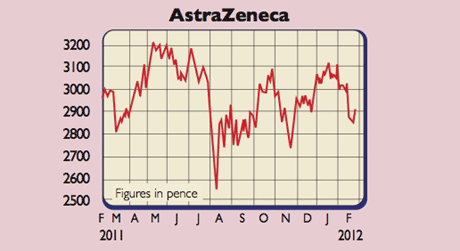Get the latest financial news, insights and expert analysis from our award-winning MoneyWeek team, to help you understand what really matters when it comes to your finances.
You are now subscribed
Your newsletter sign-up was successful
Want to add more newsletters?

Twice daily
MoneyWeek
Get the latest financial news, insights and expert analysis from our award-winning MoneyWeek team, to help you understand what really matters when it comes to your finances.

Four times a week
Look After My Bills
Sign up to our free money-saving newsletter, filled with the latest news and expert advice to help you find the best tips and deals for managing your bills. Start saving today!
Shares in GlaxoSmithKline and AstraZeneca have historically moved in lock-step. But over the past 12 months there's been a 20% relative decline in the latter, which I think looks unjustified (though not all my MoneyWeek colleagues agree seeGlaxo:a better bet than AstraZenecafor an alternative take).
AstraZeneca closed December with net funds of $2.8bn, which should support its planned $4.5bn buyback programme and 6% yield. Ageing populations and the rise of personalised medicine mean the firm also has plenty of opportunities to exploit. So why are investors pessimistic?
At its financial results presentation in February, the chief executive, David Brennan, said that he expects earnings per share (EPS) to fall 14%-18% this year to $6.00-$6.30, primarily due to the expiry of patents on key drugs and government price squeezes.
MoneyWeek
Subscribe to MoneyWeek today and get your first six magazine issues absolutely FREE

Sign up to Money Morning
Don't miss the latest investment and personal finances news, market analysis, plus money-saving tips with our free twice-daily newsletter
Don't miss the latest investment and personal finances news, market analysis, plus money-saving tips with our free twice-daily newsletter
Its anti-psychotic medicine Seroquel will lose exclusivity in the US in March, and goes off patent in Europe later in 2012. New cardiovascular drug Brilinta is off to a slow start and cholesterol buster Crestor is facing more competition following the arrival of cheap generic versions of Pfizer's market-leading Lipitor.
Patent expiries and tighter fiscal spending plans reduced sales by $3bn in 2011 to $33.6bn. By 2016, analysts worry that AstraZeneca could see up to 25% (or $8bn) of its top line disappear. But cutting another 7,300 jobs should deliver an extra $1.6bn in annual savings by the end of 2014.
AstraZeneca (LSE: AZN), rated a BUY by Panmure Gordon

The pipeline is being replenished after a couple of late-stage failures, including the delay of diabetes treatment dapagliflozin, developed with partner Bristol-Myers Squibb.
There are 86 new compounds either passing through clinical trials or that have already been submitted to the regulatory authorities. Brennan reckons these factors combined will add $2bn-$4bn to turnover by 2014. So revenues should "remain in the range of $28bn-$34bn over 2010-2014". Core operating profit margins before research and development (R&D) expenses will stay in the range of 48%-54%, compared to 54% in 2011.
Even if the drugs pipeline broke down, I still reckon the stock is worth about £25 a share. And with a large cash pile for fill-in acquisitions, its prospects are nowhere near as dire as the depressed rating suggests. I rate it on a 2.5 times multiple of future sales, which generates an intrinsic worth of £34 a share. First-quarter results are due out on 26 April. Panmure has a target price of £36.
Rating: BUY at £29
Paul Hill also writes a weekly share-tipping newsletter, Precision Guided Investments. See www.moneyweek.com/PGI or phone 020-7633 3634 for more.
Get the latest financial news, insights and expert analysis from our award-winning MoneyWeek team, to help you understand what really matters when it comes to your finances.
Paul gained a degree in electrical engineering and went on to qualify as a chartered management accountant. He has extensive corporate finance and investment experience and is a member of the Securities Institute.
Over the past 16 years Paul has held top-level financial management and M&A roles for blue-chip companies such as O2, GKN and Unilever. He is now director of his own capital investment and consultancy firm, PMH Capital Limited.
Paul is an expert at analysing companies in new, fast-growing markets, and is an extremely shrewd stock-picker.
-
 New PM Sanae Takaichi has a mandate and a plan to boost Japan's economy
New PM Sanae Takaichi has a mandate and a plan to boost Japan's economyOpinion Markets applauded new prime minister Sanae Takaichi’s victory – and Japan's economy and stockmarket have further to climb, says Merryn Somerset Webb
-
 Plan 2 student loans: a tax on aspiration?
Plan 2 student loans: a tax on aspiration?The Plan 2 student loan system is not only unfair, but introduces perverse incentives that act as a brake on growth and productivity. Change is overdue, says Simon Wilson